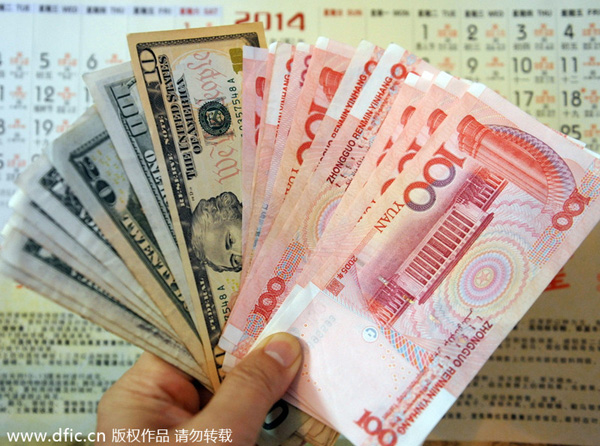 |
|
A Chinese resident displays his Chinese currency and US dollar banknotes in Qionghai city, South China's Hainan province, March 15, 2014. [Photo/IC] |
WASHINGTON - An eminent US scholar has called on the International Monetary Fund (IMF) to include renminbi, or the yuan, into the basket of the Special Drawing Rights (SDR) to reflect the importance of the Chinese economy and its currency.
The Washington-based lender has launched the five-year review of the basket of the SDR, an international reserve asset which currently comprises US dollar, Japanese yen, British pound and euro. Whether to put yuan into the basket is a major issue for this year's assessment.
Pieter Bottelier, a senior adjunct professor of China studies at the School of Advanced International Studies of the Johns Hopkins University, has told Xinhua in an interview that "it's important to recognize China's importance in the global economy and the importance of the currency. Including yuan in the SDR would be the right decision."
According to the IMF, the selections of currencies for the SDR basket are based on two criteria -- the size of the country's exports and whether its currency is freely useable. China is widely believed to meet the first criteria while the second one remains an issue.
"How to define the concept of freely usable? It's up to the IMF board to decide," said Bottelier who served as the World Bank's China country director in the 1990s.
He contended that the yuan is not a fully convertible currency, but it is clearly moving in that direction, citing steps made in the last few years which include the capital account liberalization, expanding yuan's use in cross-border transactions, and many countries having used yuan as part of their international reserves.
"The Renminbi clearly has become a very important international currency, particularly since 2009," he added.
"Depending on how you interpret the freely usable, you can either say yes or no. I'm inclined to say there are political dimensions on IMF's assessment," Bottelier said, adding "that's the reality we have to recognize."
Allocated to countries by the IMF, an SDR represents a claim to foreign currencies for which it may be exchanged in times of need. It is seen as a recognition of the preeminence of an economy if its currency is included in the basket.
The inclusion of yuan in the SDR has already received support from some advanced economies. During the IMF-World Bank Spring Meetings in April, British Finance Minister George Osborne said as part of the internationalization of yuan, it's sensible to see the yuan come into the basket. The United States, nevertheless, has reservations on that.
Bottelier said China has been pushing this agenda since early 2009. Including yuan in the SDR would encourage China to go further on the road to open the capital account and make it a more freely usable currency.
"IMF should give serious consideration to include Renminbi in the valuation base," he added.
